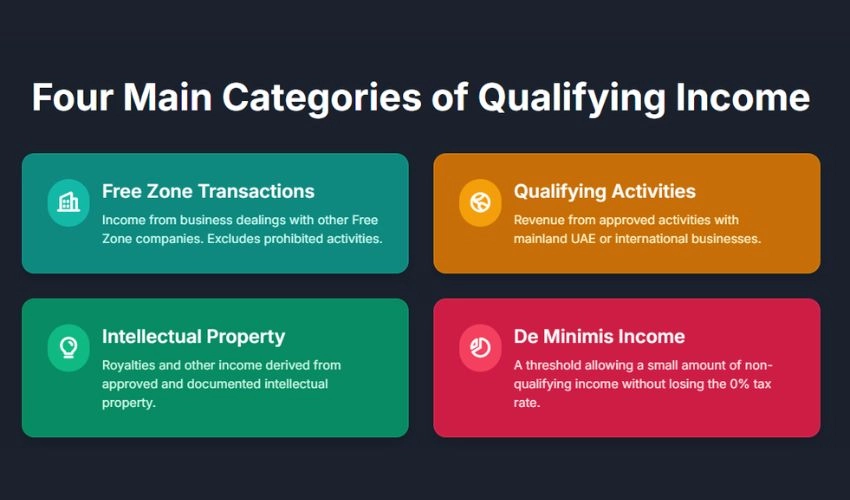Qualifying income means specific revenue streams that businesses in the UAE Free Zone earn while maintaining their 0% corporate tax rate.
According to the UAE Corporate Tax Law, which has been effective from June 1, 2023, this income type allows QFZP to avoid the standard 9% tax rate.
The rate is applied to regular businesses on profits exceeding AED 375,000.
Examples of Qualifying Income in UAE Corporate Tax
Let’s take a look at two examples that will give you good clarification of the qualifying income in the UAE corporate tax:
Example 1: You Sell Goods to Another Free Zone Company
Let’s say you are running a business in the UAE Free Zone. You sell products, for example, electronics, to another company, which is also operating in the UAE Free Zone.
So, this company will actually use the goods and not resell them. Therefore, this type of sale is a “qualifying income,” which means the government will tax it at 0% according to the corporate tax rules.
Example 2: You Provide a Service to a Client Outside the UAE
If you offer an approved service, such as market research, to a customer/client outside the UAE and not in the Free Zone, the money you generate or earn from this activity is also a “qualifying income.” Similarly, this qualifies for the 0% corporate tax rate.
The Basics of Qualifying Income Framework
The UAE Federal Tax Authority defines qualifying income as revenue derived from the QFZP. The revenue remains subject to the preferential 0% corporate tax rate.
Thus, this creates advantages for companies operating within designated free zones. However, these businesses must meet specific criteria and maintain proper substance requirements.
Cabinet Decision No. 100 of 2023 talks about the legal framework that governs these income classifications.
Free Zone companies must distinguish between qualifying and non-qualifying revenue streams. Doing so allows them to optimize their tax positions in an effective manner.
Four Main Categories of Qualifying Income

Four main categories of qualifying income are “transactions with Free Zone Persons,” “Qualifying Activities with Non-Free Zone Persons,” “Qualifying Intellectual Property Income,” and “De Minimis Income.”
Transactions with Free Zone Persons
Income generated from business dealings with other Free Zone companies qualifies for 0% taxation. However, this excludes revenue from prohibited activities. The receiving Free Zone Person must serve as the beneficial recipient of goods or services provided.
Qualifying Activities with Non-Free Zone Persons
Revenue from approved business activities conducted with mainland companies in the UAE or international businesses outside free zone qualifies. However, these activities must appear on the approved qualifying activities list.
Qualifying Intellectual Property Income
Another category is the qualifying intellectual property income. It means royalties and other income streams derived from approved intellectual property ownership or exploitation qualify for preferential treatment.
Remember, this category requires specific documentation as well as compliance with regulations that govern intellectual property.
De Minimis Income
There are some other qualifying income sources. But those occur when the Free Zone business meets de minimis thresholds. So, this means allowing small amounts of non-qualifying revenue without losing preferential status.
What is the De Minimis Requirements?
The de minimis rule allows QFZP to earn limited non-qualifying revenue and, at the same time, maintain their 0% tax status.
Non-qualifying revenue must not exceed 5% of the total revenue or AED 5 million.
The purpose of this threshold is to maintain business flexibility for companies that occasionally engage in activities outside their primary qualifying operations.
On the other hand, companies that exceed these limits are prone to risks. For instance, they might lose their QFZP status for up to four tax periods.
Difference Between Qualifying Income and Non-Qualifying Income
|
Qualifying Income |
Non-Qualifying Income |
| Revenue from approved Free Zone activities |
Revenue from excluded activities like banking or insurance |
| Income from transactions with beneficial recipients |
Income from domestic permanent establishments
|
| Intellectual property royalties meeting specific criteria |
Property rental income (except qualifying commercial property)
|
| Activities supporting international trade or specialized services |
Activities primarily serving the UAE domestic market |
Beneficial Recipient Requirements
A beneficial recipient has the right to use and take an advantage of services and goods without contractual obligations to supply these items to third parties.
So, this definition basically prevents pass-through arrangements designed to artificially qualify income for preferential tax treatment.
In addition, Free Zone companies must document beneficial recipient relationships. The purpose is to support their qualifying income classifications during tax authority reviews.
Income Exclusions and Permanent Establishments
There are some income streams, which never qualify for 0% taxation. These include:
- Domestic Permanent Establishment Income, which is revenue attributable to UAE mainland operations. These face the standard 9% taxation.
- Foreign Permanent Establishment Income means international branch income, which receives separate tax treatment.
- Immovable Property Income indicates to property-related revenue, except qualifying commercial property transactions with Free Zone persons, which faces standard taxation.
Final Words About Qualifying Income in UAE Corporate Tax
My experience with advising Free Zone companies and businesses in the UAE tell me that the qualifying income framework creates reasonable opportunities for tax optimization.
However, this requires substantial efforts and focus on substance requirements as well as transaction documentation.
Most companies in the UAE underestimate the administrative burden required to maintain qualifying status. And this is particularly about the beneficial recipient documentation and transfer pricing compliance.
I recommend establishing thorough and quality internal processes before conducting qualifying activities instead of attempting retroactive compliance.
FAQs About Qualifying Income in UAE Corporate Tax
What happens if my Free Zone business exceeds de minimis limits?
If your business exceeds de minimis limits, you will experience the loss of QFZP status for up to 4 tax periods. Remember, all income will become subject to the standard 9% corporate taxation during this period.
Can Free Zone companies earn income from UAE mainland customer?
Yes, Free Zone companies can earn income from UAE mainland customers. However, they can do this only for approved qualifying activities, which do not fall under excluded categories. In addition, the income must relate to international trade or specialized services instead of domestic market activities.
How does the beneficial recipient rule affect qualifying income?
If you are a beneficial recipient, you must have genuine rights to use goods or services without obligations to transfer them to others. Thus, this prevents artificial arrangements for tax benefits.
What documentation do Free Zone businesses need for qualifying income?
Businesses must maintain transfer pricing documentation, audited financial statements, beneficial recipient agreements, and detailed transaction records to support qualifying income classifications during tax authority reviews.
Do intellectual property royalties automatically qualify for 0% taxation?
No! Only royalties from specifically defined qualifying intellectual property meet the criteria. Therefore, the intellectual property must satisfy all the requirements mentioned in the Ministerial Decision No. 265 of 2023.
Abrar Ahmad holds a Master’s as well as an MPhil in Finance and has an extensive experience of 10+ years in managing all aspects of Taxation, VAT Consulting and Accounting. He also carries with him a working knowledge of corporate tax and has helped drive value and growth to the businesses of numerous clients.
